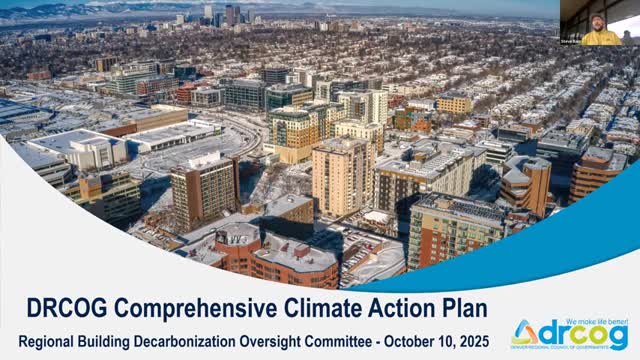DRCOG staff outline Comprehensive Climate Action Plan, set state‑aligned greenhouse‑gas goals and push regional waste collaboration
Get AI-powered insights, summaries, and transcripts
Subscribe
Summary
DRCOG staff told the oversight committee on Oct. 10 the agency will submit a Comprehensive Climate Action Plan to EPA by Dec. 1 that aligns with Colorado’s targets — 65% below 2005 emissions by 2035 and net‑zero by 2050 — and that the plan prioritizes measures the council can influence in buildings, transportation and regional waste collaboration.
The Denver Regional Council of Governments (DRCOG) told its regional building decarbonization oversight committee on Oct. 10 that the agency’s Comprehensive Climate Action Plan (CCAP) will align with Colorado’s greenhouse‑gas reduction targets — a 65% reduction from 2005 levels by 2035 and net‑zero by 2050 — and that DRCOG plans to submit the final document to the U.S. Environmental Protection Agency by Dec. 1.
Robert (last name not specified), DRCOG staff leading the planning effort, told the committee the CCAP follows an earlier Priority Climate Action Plan and expands required analysis to all greenhouse‑gas‑producing sectors, although the inventory and most proposed measures remain concentrated on buildings and transportation. “We were awarded a $1,000,000 planning grant” under the EPA Climate Pollution Reduction Grant program, Robert said, and DRCOG used the grant to hire staff and technical partners to complete the planning work.
Staff said the CCAP packages measures DRCOG can plausibly implement or influence. For buildings, the plan continues existing measures: a low‑income decarbonization program, an energy advising program, rebates and incentives, and a building‑policy collaborative. Transportation measures include expansion of regional bus rapid transit and increased funding for active transportation; two additions are larger transportation‑demand‑management programs and a potential DRCOG role in coordinating clean charging infrastructure adoption and siting.
The meeting included an extended discussion of waste. DRCOG staff said waste and wastewater together are roughly 1% of the regional greenhouse‑gas inventory but noted Colorado’s waste diversion rate is low. Robert said the region diverts about 16% of waste for recycling or composting compared with a 32% national average and reported a working group formed to develop regional policies, education and potential public‑private partnerships that could boost diversion and circular‑economy projects.
Board members from jurisdictions with landfills said local emissions can be significant even if regional shares are small. Director Baer noted that in Erie a landfill accounted for about a third of municipal emissions; she asked whether work would involve private waste operators or primarily municipalities. Robert answered the working group would pursue both: “I think all of the above,” he said, describing collaboration with private providers, pooled funding strategies and policy options for local governments.
Staff described the CCAP process and schedule. The Priority Climate Action Plan was submitted in April 2024; the comprehensive document is a required deliverable to EPA with a Dec. 1 deadline. Robert said the CCAP contains a workforce chapter, benefits analysis, and an equity assessment of how measures affect marginalized communities. He said DRCOG has about two years of grant‑funded capacity remaining to support implementation and stakeholder convening after submission.
What’s next: DRCOG plans to present the final CCAP to the full DRCOG board at a special work session on Nov. 5 and, pending board approval, submit it to EPA by Dec. 1. Staff said they will continue the waste working group and use the remaining grant period to support implementation priorities and stakeholder engagement over the next two years.
